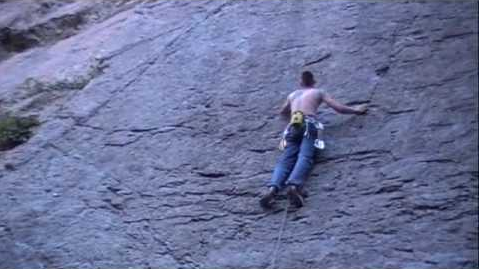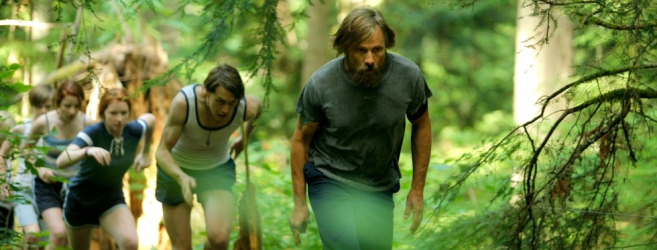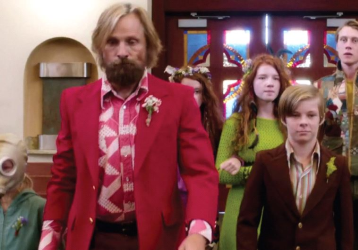I found myself being entertained by this movie about a “homeschooling” dad who takes his kids on a road trip to attend their suicidal mother’s funeral, but The Boy really nailed it when he said, “This is written by someone with no idea of what they’re talking about, and so they’re writing all this stuff they imagine to be true.” Captain Fantastic is, sorta, a variant on Beasts of the Southern Wild in the sense that the fantasy life portrayed (even if it’s not meant to be) is so spectacular, you can’t really see the other side of the argument.

Nah, go ahead, sign me up for Algebra 2.
Because this is not “homeschooling” so much as “survivalism”. And an extreme form of survivalism at that, with Ben (Viggo Mortensen) putting his kids through morning calisthenics, self-defense training, hunting, mountain climbing—and other activities that used to be called “summer camp” back in the day—while having them read great literature and do research during the evenings. The family is run as a pseudo-republic, with Ben having clearly set up the rules but ostensibly being open to his kids lobbying for changes based on a reasoned debate followed by democratic vote. But I think the idea is that he’s too overwhelming a personality for that to happen, which is something more convincing when it’s coming from (say) Robert Duvall in The Great Santini than here.
I’m going to be a bit spoiler-y here because the only way to talk about it is to point out the things that rang true and the things that did not, which requires some details. For example, early on, the oldest son, Bo (George MacKay, How I Live Now, Defiance) objects to his dad calling him something like a “Leninist” and says, “I’m a Maoist now.” The Boy bristled at that, and I was inclined to agree: Nobody becomes a Maoist without serious indoctrination and a severe deprivation of history. Ben retorts that both capitalism and communism are used to suppress the masses.
Later, the family celebrates “Noam Chomsky day” (in lieu of Christmas).

Celebrated in the traditional way: By shoplifting.
Now, I have met a number of homeschoolers who have abandoned the public school system because it wasn’t sufficiently leftist for their tastes. It’s a very common situation in Los Angeles, actually. Their special snowflakes deserve better than the system can give them (but by all means, increase that system into complete control of every other area of life). And rather astonishingly, these people complain about every interaction they have with the government while never once thinking that the problem is, you know, too much government.
But not a one of these people could survive without the easy life that the free market has given us all. Self-sufficiency requires a certain clear-eyed appraisal of actuality that is apolitical and gives no quarter to hurt feelings. So, maybe there’s a family out there like this. But more likely writer/director Matt Ross (a fine actor) made this up from whole cloth and opinion pieces because he wouldn’t find the actual sort of people who do these sorts of things very sympathetic.
And so we have some very bizarre situations that emerge.
- At one point, Bo who has spent 18 years developing primitive survival skills, shrieks “I don’t know anything unless it came out of a book!“
- One of the daughters, who has spent her life freeclimbing sheer rock faces, is apparently thwarted and nearly killed by a cheap Spanish roof tile.
- Upon falling, Ben, who has, I hasten to point out, trained his kids to free climb sheer rock faces, is startled to find that such activities have an element of danger.
- The compromise reached at the end of the film is that the family relocates to a farm house, living a rural life and going to school, rather than being completely off the grid.
- The whole premise of the film, that Leslie (Ben’s wife) wanted to be cremated after her burial, in accordance with her Buddhist beliefs is followed by a set of really un-Buddhist convictions and actions. (I mean, really, why would a Buddhist care what happened to his lifeless body? This is really just a vehicle to trash Christians.)

“Could we stop hiking long enough for me to complain about only knowing things from books, please?”
This last, the idea that of all the things wrong with Ben’s philosophy, the very worst idea was the homeschooling—not the playing with weapons, the extreme sports, the lack of any sort of hygiene for anyone, including a fully grown woman and her teenage daughters—is almost as bizarre as the notion that children who had been raised as cavemen would find sitting in a classroom for eight hours a day doable, much less a happy ending (as it is portrayed here).
Happiness, I guess, means immersing one’s self in the mediocrity of modern culture and public education. Weird.
Beyond these dubious points, the movie refuses to take any sort of a stand on the dramatic issues raised, which isn’t necessarily negative. That Ben’s wife and the children’s mother commits suicide, for example, raises the question of whether or not their lifestyle forced her to do it. It’s not really supported, but it’s fair to note that when one acts outside of the norm, ones actions (however unrelated) will be tied to any negative outcome. Like, the culture doesn’t look at women with high-powered careers, notes the higher suicide rates and says, “Hey, maybe women shouldn’t be so eager to do those things.” If observed at all, the reaction will be “Men drove her to it.”
Sometimes this ambivalence does work against the narrative, though: When Bo reveals he was accepted into every prestigious college in the country, Ben views it as a betrayal, until Ben reveals he had Leslie’s help. But why do it in secret? What happened to the debate and the vote? Was Ben really so unfaceable? Again, we’re left pondering the Great Santini (which also may have been utter nonsense, to be fair) and just not seeing that kind of personality in Ben. But his objection to college is weird: One of the reasons a person homeschools is to “school-proof” their child. To cultivate their sense of freedom, logic, reason and identity before throwing them to the authoritarians. But Mr. Ross seems to think it’s to keep the child from being exposed to…I don’t even know what given the presence of Chomsky and Mao on the reading list. The Sears catalog maybe?
As I said it was entertaining. Frank Langella plays the Evil Christian Republican as he does so often these days. But it doesn’t bear any close scrutiny and certainly doesn’t shed any light. Its high points are the fantastic and idealized notions of what life in the wild would be like. It’s low points are failing to convince us that the characters presented here have actually done that.

“C’mon, kids! If Buddha stood for anything it was upsetting people and asserting our attachment to corpses.”
